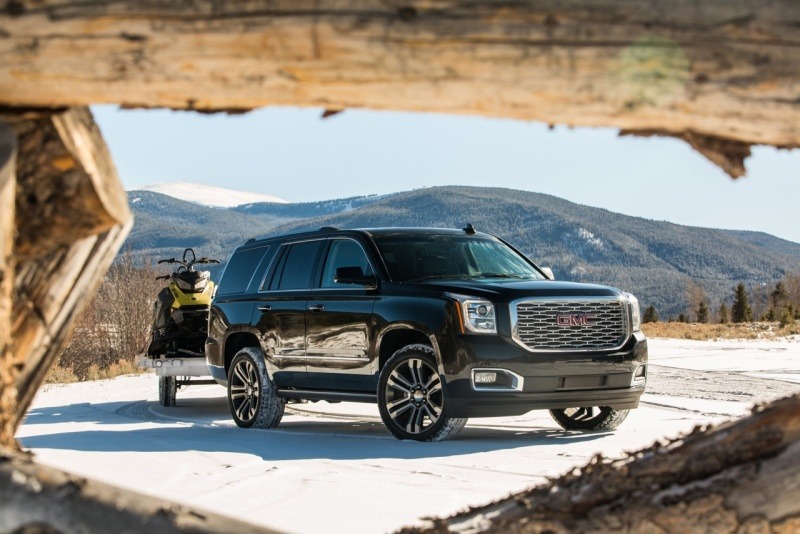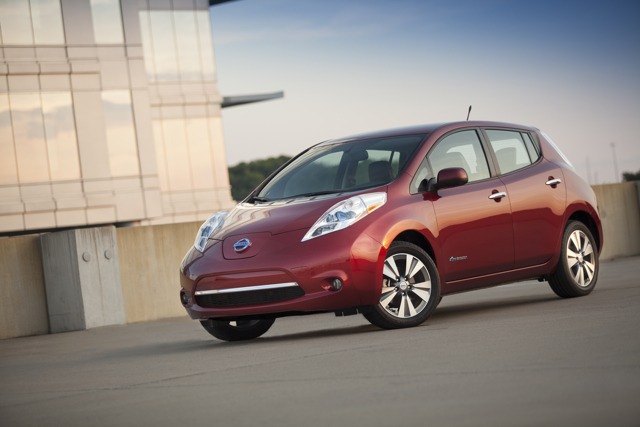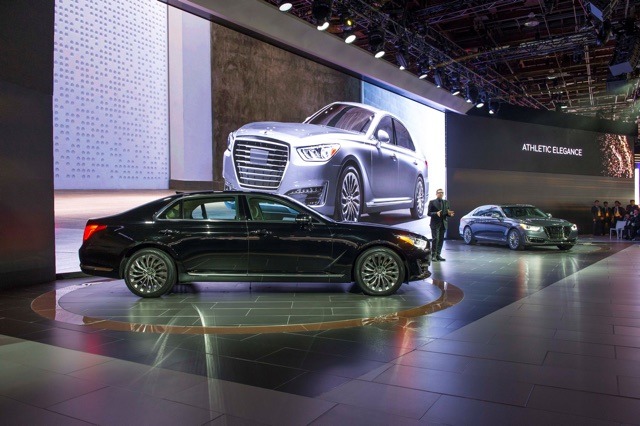Search the Community
Showing results for tags 'Luxury Cars'.
-
If you have been following auto sales for the past few years, then you know that SUVs and trucks currently dominate the sales charts partly due to the low gas prices. This is especially true when it comes to the luxury segment, where utility models are eating sedans. But a new report from The New York Times reveals that American automakers are eating the lunches of luxury car manufacturers. According to data from Edmunds, the likes of Ford, Chevrolet, and GMC have seen their share of domestic sales of models with an average price of $60,000 steadily climbing, while luxury brands like Mercedes-Benz, Porsche, and Lexus have been declining. GMC, in particular, has shown the largest growth, accounting 11.3 percent of domestic sales of $60,000-plus models in 2017. Five years ago, the brand only made up 0.1 percent of those sales. A lot of this credit can be laid at the feet of GMC's Denali brands. At a recent investor conference, GM showed data that the Denali line had an average sale price of $56,000 - more than the average price of an Audi, BMW, or Mercedes-Benz. “This thing is a money machine,” said GM's president Dan Ammann about Denali. Over at Ford, more than half of F-150 sales are made up by the Lariat, King Ranch, Raptor models. Only a few years ago, those models made up a third. Why are American automakers seeing a massive increase in expensive SUVs and trucks? Part of it comes down to price, but there is also the image. “We’ve been taking in Lexuses on trade-ins, BMWs," said Gary Gilchrist, owner of a GMC dealer in Tacoma, Washington. “People used to want German cars for the image factor. Now, if you have a Denali, you get that. People turn their heads to look.” Source: New York Times View full article
- 67 replies
-
- american automakers
- features
-
(and 4 more)
Tagged with:
-

More Luxury Car Buyers Are Moving to Trucks and SUVs
William Maley posted an article in Automotive Industry
If you have been following auto sales for the past few years, then you know that SUVs and trucks currently dominate the sales charts partly due to the low gas prices. This is especially true when it comes to the luxury segment, where utility models are eating sedans. But a new report from The New York Times reveals that American automakers are eating the lunches of luxury car manufacturers. According to data from Edmunds, the likes of Ford, Chevrolet, and GMC have seen their share of domestic sales of models with an average price of $60,000 steadily climbing, while luxury brands like Mercedes-Benz, Porsche, and Lexus have been declining. GMC, in particular, has shown the largest growth, accounting 11.3 percent of domestic sales of $60,000-plus models in 2017. Five years ago, the brand only made up 0.1 percent of those sales. A lot of this credit can be laid at the feet of GMC's Denali brands. At a recent investor conference, GM showed data that the Denali line had an average sale price of $56,000 - more than the average price of an Audi, BMW, or Mercedes-Benz. “This thing is a money machine,” said GM's president Dan Ammann about Denali. Over at Ford, more than half of F-150 sales are made up by the Lariat, King Ranch, Raptor models. Only a few years ago, those models made up a third. Why are American automakers seeing a massive increase in expensive SUVs and trucks? Part of it comes down to price, but there is also the image. “We’ve been taking in Lexuses on trade-ins, BMWs," said Gary Gilchrist, owner of a GMC dealer in Tacoma, Washington. “People used to want German cars for the image factor. Now, if you have a Denali, you get that. People turn their heads to look.” Source: New York Times- 67 comments
-
- american automakers
- features
-
(and 4 more)
Tagged with:
-
Kelly Blue Book has listed the ten vehicles that deprecate at alarming rate and top three happen to be electric vehicles. The Nissan Leaf according to KBB is projected to only retain 18 percent of its new-car price after five years. Behind the Leaf is the Fiat 500e which is expected to retain 21 percent and the Smart ForTwo EV which is expected to retain 21.5 percent. Few key items to keep in mind: Fiat 500e is only available to lease in California A number of automakers, like Nissan have been dropping the price of the EVs Electric vehicles come with a number of incentives from the U.S. and state governments, which in turn hurt the resale value Eric Ibara, director of residual consulting for Kelley Blue Book tells USA Today EVs have a problem of finding someone to buy a used one. "Pure electrics have been slow to catch on in the resale market." Customers "have been willing to buy a new one, not a used electric vehicle." As to why, Ibara doesn't have a good answer to this. The remaining seven vehicles on KBB's list are all luxury vehicles such as the BMW 7-Series, Lincoln MKS, and Jaguar XK. Nissan Leaf - 18% Fiat 500e - 21% Smart fortwo electric - 21.5% Jaguar XJ - 22.2% Volkswagen CC - 25% Mercedes-Benz CL-Class - 25.8% BMW 7 Series - 26% Volvo S80 - 27.3% Lincoln MKS - 27.5% Jaguar XK Series - 27.6% Source: USA Today William Maley is a staff writer for Cheers & Gears. He can be reached at [email protected] or you can follow him on twitter at @realmudmonster. View full article
- 30 replies
-
- Electric Vehicles
- Luxury Cars
-
(and 2 more)
Tagged with:
-
Kelly Blue Book has listed the ten vehicles that deprecate at alarming rate and top three happen to be electric vehicles. The Nissan Leaf according to KBB is projected to only retain 18 percent of its new-car price after five years. Behind the Leaf is the Fiat 500e which is expected to retain 21 percent and the Smart ForTwo EV which is expected to retain 21.5 percent. Few key items to keep in mind: Fiat 500e is only available to lease in California A number of automakers, like Nissan have been dropping the price of the EVs Electric vehicles come with a number of incentives from the U.S. and state governments, which in turn hurt the resale value Eric Ibara, director of residual consulting for Kelley Blue Book tells USA Today EVs have a problem of finding someone to buy a used one. "Pure electrics have been slow to catch on in the resale market." Customers "have been willing to buy a new one, not a used electric vehicle." As to why, Ibara doesn't have a good answer to this. The remaining seven vehicles on KBB's list are all luxury vehicles such as the BMW 7-Series, Lincoln MKS, and Jaguar XK. Nissan Leaf - 18% Fiat 500e - 21% Smart fortwo electric - 21.5% Jaguar XJ - 22.2% Volkswagen CC - 25% Mercedes-Benz CL-Class - 25.8% BMW 7 Series - 26% Volvo S80 - 27.3% Lincoln MKS - 27.5% Jaguar XK Series - 27.6% Source: USA Today William Maley is a staff writer for Cheers & Gears. He can be reached at [email protected] or you can follow him on twitter at @realmudmonster.
- 30 comments
-
- Electric Vehicles
- Luxury Cars
-
(and 2 more)
Tagged with:
-
Genesis is following in the footsteps of other luxury automakers by planning a number of plug-in models. Speaking with Automotive News, Hyundai Motor America' CEO Dave Zuchowski said Genesis and Hyundai are working on a number of plug-in hybrid vehicles. Zuchowski explained the brands see this a stepping stone to hydrogen vehicles. "Some of those [plug-in hybrids] will take the form of the Genesis side of our business. We believe alternative-propulsion engines are going to be really important -- even more important in the luxury market than they are in the mainstream market," said Zuchowski. Zuchowski kept quiet on Genesis vehicles will get the plug-in treatment. But considering Genesis' lineup in the near future will include will include a couple of SUVs and a small compact sedan to join the G80 midsize sedan and G90 flagship, we wouldn't be surprised if one of those SUVs and the G90 get the plug-in option. Source: Automotive News (Subscription Required)
- 3 comments
-
Genesis is following in the footsteps of other luxury automakers by planning a number of plug-in models. Speaking with Automotive News, Hyundai Motor America' CEO Dave Zuchowski said Genesis and Hyundai are working on a number of plug-in hybrid vehicles. Zuchowski explained the brands see this a stepping stone to hydrogen vehicles. "Some of those [plug-in hybrids] will take the form of the Genesis side of our business. We believe alternative-propulsion engines are going to be really important -- even more important in the luxury market than they are in the mainstream market," said Zuchowski. Zuchowski kept quiet on Genesis vehicles will get the plug-in treatment. But considering Genesis' lineup in the near future will include will include a couple of SUVs and a small compact sedan to join the G80 midsize sedan and G90 flagship, we wouldn't be surprised if one of those SUVs and the G90 get the plug-in option. Source: Automotive News (Subscription Required) View full article




